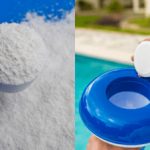Maintaining a clean and hygienic swimming pool requires the appropriate chlorine levels. For years, pool owners and professionals have debated the best method: liquid chlorine or chlorine tablets. Both options have their advantages and disadvantages, and understanding them is crucial for simplifying pool care. In this article, we will delve into the specifics of each to help you make an informed decision.
Ⅰ. Liquid Chlorine
Liquid chlorine, also known as sodium hypochlorite, is a popular choice for many pool owners. This chlorine solution is typically added directly to the pool water and quickly disperses to kill bacteria and other harmful organisms.

1.Advantages of Liquid Chlorine
Fast-Acting: One of the biggest benefits of liquid chlorine is its rapid action. It quickly disinfects the water, making it an excellent choice for addressing immediate chlorine needs, such as after heavy pool usage or after a rainstorm.
Cost-Effective: Generally, liquid chlorine tends to be less expensive compared to other chlorine products, especially when purchased in bulk. This makes it a budget-friendly option for many pool owners.
No Residue: Liquid chlorine does not leave any residue in the pool, ensuring a clean environment without the need for additional cleaning.
2.Disadvantages of Liquid Chlorine
Short Shelf Life: Liquid chlorine degrades over time, especially when exposed to sunlight. This means it must be stored properly and used relatively quickly, which can be a drawback for those who prefer to buy in bulk.
Handling Precautions: Handling liquid chlorine requires caution. It is a potent chemical and can be hazardous if not managed correctly. Proper safety measures, such as wearing gloves and goggles, are essential.
Frequent Application: Liquid chlorine dissipates faster than other forms of chlorine, meaning it needs to be added more frequently. This can be seen as a disadvantage for those looking for a low-maintenance option.
Ⅱ. Chlorine Tablets
Chlorine tablets, often referred to as trichlor tablets, are a slow-dissolving form of chlorine that is added to a pool’s skimmer, floater, or automatic feeder. They are highly popular due to their ease of use and long-lasting effects.

1.Advantages of Chlorine Tablets
Convenience: Chlorine tablets dissolve slowly, providing a steady supply of chlorine with less frequent application. This makes pool maintenance much easier, especially for busy pool owners.
Long Shelf Life: Chlorine tablets are stable and can be stored for longer periods without losing effectiveness. This makes them a great option for those who prefer to buy their pool chemicals in advance.
Ease of Use: They are simple to handle and apply, reducing the risk of spills and accidents. This ease of use is particularly appealing for those who are new to pool maintenance.
2.Disadvantages of Chlorine Tablets
pH Imbalance: One of the downsides of chlorine tablets is that they can lower the pH of the pool water. This means additional chemicals may be needed to maintain the correct pH balance.
Residue: Tablets may leave some residue, such as partially dissolved pieces, which need to be cleaned up. This can add a bit more work to your pool maintenance routine.
Cost: Generally, chlorine tablets are more expensive than liquid chlorine. However, many pool owners find the convenience and ease of use worth the extra cost.
Ⅲ. Choosing the Right Option
When deciding between liquid chlorine and chlorine tablets, consider the following factors:
1.Pool Size and Usage:
Larger pools or those with heavy usage may benefit from the quick action of liquid chlorine, which can rapidly address sudden changes in chlorine demand. On the other hand, smaller pools or pools with more consistent usage might find the convenience of tablets more suitable.
2.Budget:
If cost is a primary concern, liquid chlorine might be the more economical option, especially for larger pools that require significant amounts of chlorine. However, the convenience and stability of tablets might justify their higher cost for those looking for a hassle-free solution.
3.Maintenance Routine:
If you prefer a low-maintenance approach to pool care, chlorine tablets might be the better option due to their slow-dissolving nature and longer shelf life. This can save you time and effort in the long run, as you won’t need to add chlorine as frequently.
Ⅳ. Conclusion
Both liquid chlorine and chlorine tablets offer effective solutions for maintaining your pool. Understanding their pros and cons will help you make the best choice based on your specific needs and preferences. By weighing factors like cost, convenience, and maintenance, you can ensure a clean and safe swimming environment. Whether you opt for the fast-acting power of liquid chlorine or the steady, low-maintenance release of chlorine tablets, you’ll be well-equipped to keep your pool sparkling clean all season long.





